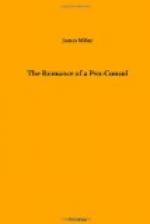‘Somehow,’ quoth Sir George, ’we didn’t seem to mind the risks, and I imagine that is the experience of everybody who has encountered any. A man is zealous upon some task, it quite occupies him, and the dangers are just details. Afterwards, his friends make him out to be a bit of a hero, and he has leisure to fancy so himself, which is all entirely harmless. Now, I had to swim across an arm of the sea, where a violent tide ran, and where alligators and sharks had their haunts. The latter, I believed from observations made when we bathed off the schooner, could smell a human body in the water from a long distance. But the plain necessity was that, for the succour of certain members of the expedition, I must swim the lagoon.’
A nearer hazard furnished Sir George with a knowledge, which a call from his friend Sir Charles Lyell, the geologist, enabled him to use in fun. Lyell walked in on him, in London, with a spear-head and the curiosity, ‘How old do you judge that would be?’ The weapon was of stone, uncouth, barbarous. ‘A thousand years, eh?’ Lyell pursued. Sir George let him go on for a while, then broke in, ’If that’s a thousand years old, I likewise am a thousand years old, because one has been taken out of me.’ ‘What do you mean?’ was Lyell’s ejaculation. ‘Oh,’ said Sir George, ’a head almost similar was on the spear which an Australian native drove into my thigh.’
Whereupon laughter, and tale of the fight.
VI MAN AND NATURE ABORIGINAL
There never had been such a drama in that forest of North-West Australia. The noise of the white man’s war fell upon the primeval silence, breaking it.
This battle dwelt acutely with Sir George Grey as the single occasion, amid all his adventures, on which he had been the instrument of taking human life. He carried his own wounds to the grave, but only sorrowed for the bullet he sped, though sheer necessity drove it. The sacred light might burn in a savage, ignorant of its nobler gleams, yet it was the gift of the Creator. Moreover, Sir George’s whole dealing, towards native races, was guided by a pole-star principle. The duty civilisation owed them, he affirmed, was the larger in proportion to their state of darkness. He held this to be the simple rule for the Christian.
The natives of the Australian North-West were a fine race physically, and, he judged, had an ingrain of Malay blood. ’To see one for the first time,’ said Sir George, ’produced a great effect upon you. These people were hardly known then.’ They coloured themselves in fearsome style, red being the favourite daub. No matter, the strangers from over sea would have greeted them gladly, being anxious to cultivate friendship. The wild men responded not; but hovered in the distance of the bush, or peered curiously from some covering of the rocks.
‘I did everything I could,’ Sir George remarked in that relation, ’to get acquainted with them, but at this period they would have nothing to do with me. Their fires might still be smoking, as we beat up a camping place, but they had left, suspicious of us. When travelling, I frequently had grave cause to be anxious lest we should be attacked, especially at night. Therefore, I made my men sleep a little apart from each other, in order that, if assailed, we might at least have some warning.’




